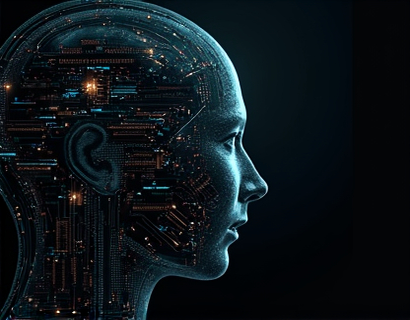Revolutionizing User Engagement: The Synergy of Crypto and AI in the Digital Age
The intersection of cryptocurrency and artificial intelligence (AI) is ushering in a new era of digital innovation, fundamentally transforming user engagement across various platforms and applications. This synergy is not just about combining two cutting-edge technologies but about creating a seamless, secure, and highly personalized digital experience. As we delve into the latest advancements, it becomes evident that the integration of crypto and AI is redefining how users interact with digital content, driving unprecedented growth and engagement in the tech landscape.
The traditional models of user engagement are being reimagined through the lens of blockchain technology and machine learning. Blockchain provides a decentralized, transparent, and secure framework, while AI brings intelligence, adaptability, and predictive capabilities to the table. Together, they offer a powerful toolkit for developers and businesses aiming to enhance user experiences and foster meaningful connections.
Enhanced Security and Trust
One of the primary benefits of integrating cryptocurrency with AI is the enhancement of security and trust. Blockchain's inherent properties ensure that transactions are immutable and verifiable, reducing the risk of fraud and data breaches. AI, with its advanced analytics and pattern recognition, can further bolster security by detecting and mitigating potential threats in real-time. This dual approach not only protects user data but also builds a higher level of trust, encouraging more users to engage with digital platforms.
For instance, AI-driven security protocols can monitor user behavior and identify anomalies that may indicate malicious activity. By combining this with the transparency of blockchain, any suspicious transactions can be flagged and addressed promptly. This level of security is crucial for applications handling sensitive information, such as financial services, healthcare, and personal data management.
Personalized User Experiences
AI's strength lies in its ability to analyze vast amounts of data and derive actionable insights. When applied to user engagement, AI can create highly personalized experiences tailored to individual preferences and behaviors. By leveraging machine learning algorithms, platforms can understand user habits, predict future actions, and deliver content that resonates with each user. This personalization not only increases user satisfaction but also boosts engagement and retention rates.
For example, a streaming service can use AI to analyze viewing patterns and suggest content that aligns with a user's interests. Similarly, an e-commerce platform can recommend products based on past purchases and browsing history. The integration of cryptocurrency adds another layer by enabling seamless, secure transactions for in-app purchases or subscriptions, ensuring a smooth and trustworthy experience.
Decentralized Applications and User Empowerment
Decentralized applications (dApps) powered by blockchain technology are redefining user empowerment. Unlike traditional centralized applications, dApps operate on a decentralized network, giving users more control over their data and interactions. AI enhances this by providing intelligent interfaces that adapt to user needs, making dApps more user-friendly and accessible.
In a decentralized ecosystem, users can own their data and decide how it is used, shared, and monetized. AI can facilitate this by offering personalized dashboards and tools that help users manage their digital assets and interactions. For instance, a decentralized social media platform can use AI to curate content based on user preferences while ensuring that users retain ownership of their posts and interactions.
Predictive Analytics and User Behavior
AI's predictive analytics capabilities are invaluable for understanding and predicting user behavior. By analyzing historical data, AI can forecast user actions and preferences, allowing platforms to proactively enhance the user experience. This foresight can lead to more effective marketing strategies, improved user retention, and increased engagement.
For example, an AI system can predict which users are likely to churn and implement targeted retention strategies. By identifying key factors that influence user satisfaction, such as content quality, interface design, and customer support, platforms can make data-driven decisions to enhance the overall experience. The integration of cryptocurrency ensures that any rewards or incentives offered to users are secure and transparent, further enhancing trust and engagement.
Tokenization of Rewards and Incentives
Tokenization, a concept deeply rooted in cryptocurrency, offers a innovative way to reward and incentivize user engagement. By issuing tokens that represent value within a platform, users can earn and trade rewards based on their activities. AI can optimize the distribution and valuation of these tokens, ensuring that they are aligned with user behavior and platform goals.
For instance, a gaming platform can use AI to analyze player actions and award tokens for achieving milestones or contributing to the community. These tokens can then be used to purchase in-game items, access exclusive content, or even traded for real-world value. The transparency and security of blockchain ensure that the token economy is fair and trustworthy, encouraging active participation and long-term engagement.
Smart Contracts and Automated Interactions
Smart contracts, self-executing contracts with the terms directly written into code, are another area where crypto and AI converge to enhance user engagement. These contracts can automate various processes, from transactions to content delivery, reducing the need for intermediaries and increasing efficiency. AI can optimize the logic and execution of smart contracts, ensuring they adapt to changing conditions and user needs.
For example, a content creation platform can use smart contracts to automatically distribute royalties to creators based on usage metrics. AI can analyze usage data in real-time, ensuring that payments are accurate and timely. This level of automation not only streamlines operations but also builds trust among users, knowing that the system is fair and transparent.
Enhancing Customer Support through AI
Customer support is a critical aspect of user engagement, and AI can significantly improve the quality and efficiency of support services. Chatbots and virtual assistants powered by AI can provide instant, personalized assistance to users, handling a wide range of queries and issues. The integration of blockchain ensures that user data and interactions are secure and private, enhancing user confidence in the support system.
AI-driven analytics can also help identify common issues and trends, allowing support teams to proactively address potential problems. By combining this with the transparency of blockchain, users can track the status of their support requests and receive updates in real-time. This holistic approach ensures that users feel valued and supported, fostering a positive relationship with the platform.
Building Community and Collaboration
Crypto and AI can also facilitate the building of vibrant communities and collaborative ecosystems. Decentralized platforms can leverage AI to match users with similar interests or complementary skills, fostering collaboration and knowledge sharing. Tokenization can incentivize participation and contribution, creating a self-sustaining community driven by shared goals and rewards.
For example, a blockchain-based educational platform can use AI to pair learners with mentors based on their learning paths and goals. Tokens can be earned for contributing tutorials, answering questions, or participating in discussions. This creates a dynamic and engaging environment where users are motivated to contribute and grow together.
Challenges and Considerations
While the potential of combining crypto and AI is vast, there are challenges and considerations that must be addressed. Regulatory compliance is a significant concern, as the crypto space is still evolving and subject to varying regulations across jurisdictions. Ensuring compliance while leveraging the benefits of these technologies requires careful navigation and expertise.
Another challenge is the technical complexity involved in integrating blockchain and AI systems. Developers need to possess a deep understanding of both domains to create seamless and efficient solutions. Additionally, user education is crucial, as many users may be unfamiliar with these technologies. Providing clear, accessible information and intuitive interfaces can help bridge this gap.
Future Prospects
The future of user engagement in the digital age is bright, with the synergy of crypto and AI poised to drive further innovation and growth. As technology continues to advance, we can expect more sophisticated applications and use cases that enhance the user experience in unprecedented ways. The key will be to focus on creating secure, personalized, and empowering experiences that resonate with users and meet their evolving needs.
In conclusion, the integration of cryptocurrency and AI is not just a technological trend but a transformative force that is reshaping the digital landscape. By embracing these innovations, platforms can offer enhanced security, personalized experiences, and meaningful connections, ultimately leading to greater user engagement and satisfaction.











































